Monday Feb 23, 2026
Monday Feb 23, 2026
Friday, 10 January 2020 00:00 - - {{hitsCtrl.values.hits}}
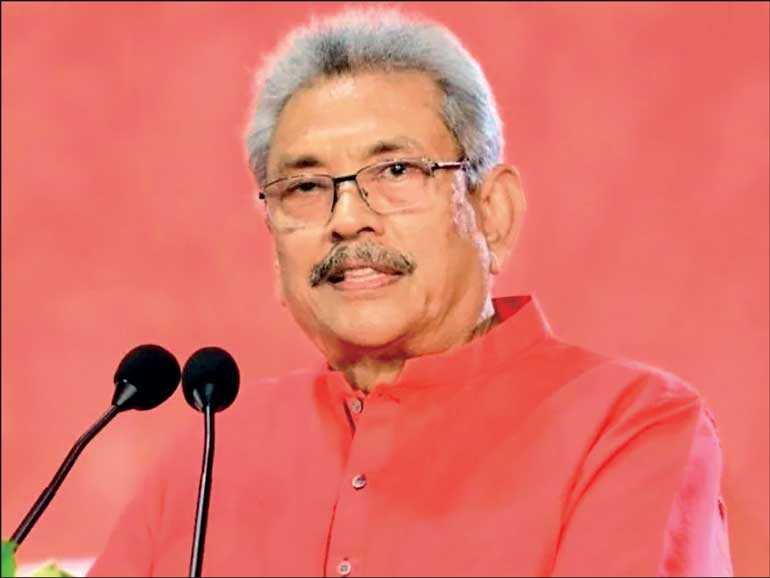
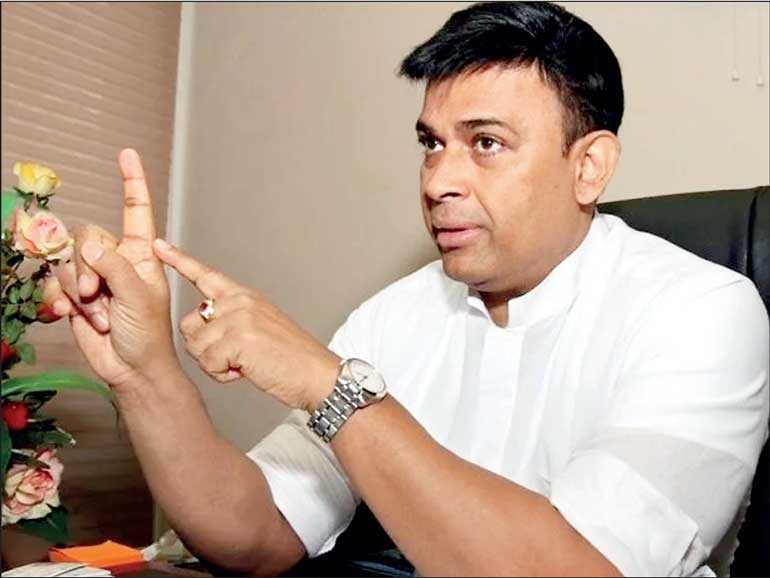
The police had taken into custody, 338 CDs containing recordings of telephone conversations, found in the residence of MP Ranjan Ramanayake. The number of telephone conversations recorded in them is more than 13,000. Ranjan Ramanayake had followed a tradition of recording telephone conversations  originated by him as well as those he received from others.
originated by him as well as those he received from others.
It is not ethical and proper to record a telephone conversation without the knowledge and consent of the other person. I have worked as a newspaper editor for a very long period; yet, I had never recorded any conversation, no matter how important it was, without the approval of the other party. But there are journalists who used to record telephone conversations without obtaining permission from the people they talk to. Ranjan Ramanayake had maintained a tradition of recording all the telephone conversations. He has collected them passionately and let others listen to them at occasions such as press conferences.
The massive collection of recorded telephone conversations kept by Ranjan Ramanayake is going to create huge turmoil in Sri Lanka, similar to the confusion created by the WikiLeaks in international arena. Similarly, Ranjan’s recorded telephone conversations will cause to push a lot of people from all walks of life into a big quandary. It is likely to create a situation in which it would be impossible to carry forward all the cases of political nature which were filed during the Yahapalana regime.
The public will find sensational and relishing stories to harp on and live in a dream world, forgetting the stark reality of the country until the next general election. At the same time, these stories might lead to make the life of many people of different levels confused and even humiliated while some may be forced to resign from their official positions.
There can be the ex president, the ex prime minister and his ministers, judges, legal officials, other government officials and academics among them. It is likely that even the names of the members of the previous opposition may be dragged into the list. Perhaps, the judiciary may be the biggest victim of the damage.
The reign of Mahinda Rajapaksa was not a period when there were no serious offences committed. Lasantha’s assassination is not a lie. The incidents of abduction and brutal assault of journalists like Poddala Jayantha and Keith Noyahr cannot be considered fabricated falsehood. Similarly, the abduction of youths for ransom and later killing them cannot be considered a fabrication. Possibly, there might have been fabricated stories also among them. However, the CDs of Ranjan, taken into police custody will inevitably create a chaotic situation in which none of the above cases would be possible to be pursued.
The extreme acts of this nature cannot be considered to have occurred only during the reign of Mahinda Rajapaksa. Gruesome incidents of this nature had occurred earlier during the reign of Chandrika Kumaratunga as well. The assassinations of Rohana Kumara, editor, Satana tabloid newspaper and Kumar Ponnambalam are two instances that can be cited to prove this. Similar incidents happened during the regimes of Premadasa and J.R. Jayewardene also. 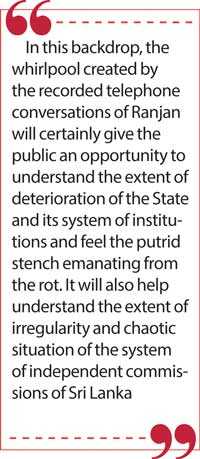
Prior to that, there was no practice of probing into offences committed by previous regimes except that Sirima Bandaranaike and Felix Dias Bandaranayake were punished during the regime of J.R. Jayewardene. Thereafter, the parliamentary opposition, except for criticising the wrongdoings of the government abstained from taking action against the wrongdoings of the previous government and punish the culprits when it came to power.
It was the Yahapalana regime that initiated the tradition of investigating into the wrongdoings of the previous government and prosecuting and punishing the offenders. It is appropriate to recall a statement that I made during a discussion on a TV channel at the time when this tradition was introduced. I said that, if we were to look into the past offences, the correct approach would be to investigate into offences of all previous regimes, rather than restricting its scope only to the Rajapaksa regime.
Cycle of revenge
If the Yahapalana regime resorts to restrict it only to the period of the Rajapaksa regime, with the view to take revenge, ignoring the principle that I highlighted, I stressed that it will invariably create a cycle of revenge so that the next government that succeeds the Yahapalana regime will do the same thing to revenge from the latter. However, in the final analysis, even the cycle of revenge would be of benefit to the country, I said.
The Yahapalana Government showed one side of the coin to the country. Now the present government has begun to show the other side of it. In this process, the public will be enabled to apprehend the degree of deterioration of all important institutions of the country particularly, the extent of degradation of the judiciary.
Shani Abeysekara can be considered as one of the best criminal investigators produced by Sri Lanka. But, it can be said that he had completely lost his reputation for being a part of the stupid program of Yahapalana Government.
The Yahapalana Government can be considered a stupid and ineffective government that did not know how to do anything properly and methodically. If it wanted to investigate the wrongdoings of the Rajapaksa regime, it should have created a framework that would promote the confidence of everyone and prevent all political interferences. Instead, what it did was to introduce a framework that allowed politicians of the government to interfere with its proceedings.
Extent of political interfering
The CD collection of Ranjan’s telephone conversations will reveal to the public, the extent of political interfering in the proceedings of criminal investigations, for both good and bad. 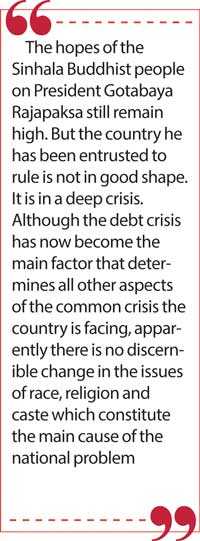
The number of people likely to face insult and criticism as a result of this scandal will be many. Not just the ex president, ex prime minister and ministers, judges, law officers, even some civilians who had no official power but were able to interfere with the activities of the Yahapalana Government will become the victims of humiliation, disgrace and embarrassment, and perhaps more serious consequences.
In this backdrop, the whirlpool created by the recorded telephone conversations of Ranjan will certainly give the public an opportunity to understand the extent of deterioration of the State and its system of institutions and feel the putrid stench emanating from the rot. It will also help understand the extent of irregularity and chaotic situation of the system of independent commissions of Sri Lanka.
In any case, the situation of the country is not normal. It is in a great crisis similar to a situation of being caught in a massive cyclone. However, still there is a possibility to recreate a new country, new state and a new society capable of overcoming the degeneration of the country provided the politicians, bureaucrats, educators and the ordinary people of this country (being concerned with the whirlpool going to burst out soon consequent to the disclosure of Ranjan’s recorded telephone conversations) will be able to realise the need for adopting a people based program of structural reforms which is not confined to a narrow framework of a political party.
National Anthem
The hopes of the Sinhala Buddhist people on President Gotabaya Rajapaksa still remain high. But the country he has been entrusted to rule is not in good shape. It is in a deep crisis. Although the debt crisis has now become the main factor that determines all other aspects of the common crisis the country is facing, apparently there is no discernible change in the issues of race, religion and caste which constitute the main cause of the national problem.
Since the President had been elected solely by the Sinhala Buddhist votes, obviously he is forced to carry out the affairs of the Government without harming the Sinhala Buddhist image of the Government. Consequently, he is compelled to maintain the Sinhala Buddhist stance rather than adopting a neutral approach in addressing the crisis of the country.
Apparently, the next big dream of the President is to secure a two-thirds majority in the Parliament with the support of the Sinhala Buddhist votes at the forthcoming General Election and therefore, he seems to issue appropriate signals occasionally, to keep the Sinhala Buddhist enthusiasm from waning.
It appears that the Government has made it mandatory that the National Anthem should be sung in Sinhala only, presumably to indicate that there is no change in its Sinhala Buddhist stance despite the relaxed policy it adopted in regard to the issue of Heroes’ Day celebrations in the north.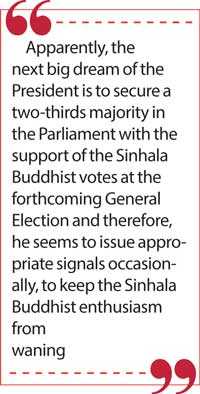
The policy of the Government that the National Anthem should be sung only in Sinhala will not be to the satisfaction of Tamil people. However, it might not hurt them as much as Bandaranaike’s Sinhala-only policy had oppressed them. It is unlikely that the Government’s policy on the National Anthem will serve to strengthen the image of the president.
As Professor K.M. de Silva has noted in the biography of J.R. Jayawardene, the government of D.S. Senanayake, elected in 1948 had to take a quick decision with regard to the National Anthem to be sung at the independence day celebration scheduled to be held in February 1949 as the previous national anthem – ‘God Save the King/Queen’ sung during the colonial rule was no longer valid for independent Sri Lanka.
J.R. Jayewardene remembered the song ‘Namo Namo Mata’ (Oh Mother Lanka, we salute, salute, salute, Thee!), composed and sung by Ananda Samarakoon with his musical orchestra at the National Conference held in 1934. He submitted a proposal to the Cabinet to select an appropriate national anthem. Accordingly, a Cabinet Sub Committee headed by E.A.P. Wijeratne was appointed. J.R. Jayawardene also served as a member of the committee. G.G. Ponnambalam and C. Chittambalam too served as the members of the committee.
Ananda Samarakoon was summoned before the committee. The committee indicated that they wish to adopt the song ‘namo namo matha’ composed by him as the official national anthem of independent Sri Lanka and suggested that as the original song had been composed during the British rule, the 10th line of it – ‘Navajeevanya Demine’ must be changed to suit the present status of the country. Ananda Samarakoon acquiesced to the request and modified it to read as ‘Nava jeevana demine nithina apa pubudu karan mata’ (Inspire us for ever giving us a new life).
The committee also decided that there should be a Tamil version of the National Anthem and Pandith M. Nallathambi, a Tamil scholar was entrusted with the task to translate it into Tamil.
On 12 March 1952, the Government published the Sinhala and Tamil version of the National Anthem, in the form of a prominent advertisement in all the newspapers in Sinhala, Tamil and English. Since then the National Anthem was sung in Tamil at all official ceremonies held in the Northern and Eastern Provinces. The Radio Ceylon produced a record of Sinhala and Tamil version of the National Anthem. Music for both versions was composed by Ananda Samarakoon while the Tamil version was sung by two Tamil singers, Sangari and Veena.
In February 1960, despite Ananda Samarakoon’s strong protest, the Government of Sirima Bandaranaike replaced the opening line ‘Namo Namo Maatha’ of the National Anthem with ‘Sri Lanka Maatha’, alleging that there was an inauspicious error in the syllabic configuration (Ghana) of its first line. It was as a result of this dispute that Ananda Samarakoon, eventually committed suicide, out of frustration, by taking an overdose of sleeping tablets.
The Tamil version of the official National Anthem was sung in Tamil in the north and east where Tamil people lived until Prabhakaran banned the use of it, in the areas which came under his control.
The question whether it was appropriate to sing the official National Anthem in Tamil came to the fore in 2010 following the ending of the internal civil war.
Civility of a nation
President Mahinda Rajapaksa was of the view that the National Anthem should be sung only in Sinhala. The Yahapalana regime lifted the ban imposed by the former. It has again been renewed after President Gotabaya Rajapaksa assumed office.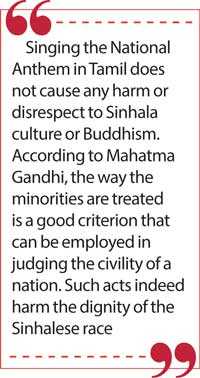
One of the most important points that the new government must recognise is that the Sinhala Official Language Act of 1956 is no longer valid and the Articles 18 and 19 of the 1978 Constitution has provided official language status not only for Sinhala language but also for the Tamil language. This provision is applicable to legislation as well as to all the affairs of the State.
Singing the National Anthem in Tamil does not cause any harm or disrespect to Sinhala culture or Buddhism. According to Mahatma Gandhi, the way the minorities are treated is a good criterion that can be employed in judging the civility of a nation. Such acts indeed harm the dignity of the Sinhalese race.